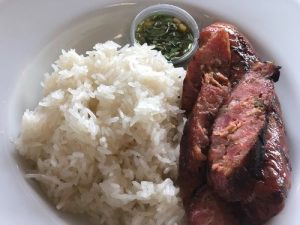As obesity has become a bigger and bigger issue in the United States, nutritionism has become an essential part of our food culture and diet. Nutritionism, while it provides us knowledge of the foods we are putting into our bodies, it can restrict the types of food we eat and thus take away the idea of food culture. Instead of eating the foods we enjoy, we are more concerned about its nutritional components. Coming from a minority background, where my parents emigrated from Laos, food is a way for me to continually stay connected to my cultural roots especially in a country with strong western influences and a dominating American culture. My cultural foods/diets, Hmong food, do not follow typical western foods/diets and would be considered unhealthy among western ideals as Hmong foods rely heavily on carbs (white rice), lard, meat, salt and MSG. Why does this matter? The idea of nutirtionism can pressure consumers to choose between health and one’s native culture. I find myself caught in that dilemma of struggling to continually eat healthy when I am surrounded by my cultural foods. Maniates discussion on individualization has given me some clarity on how I can approach my dilemma.
The article, Individualization: Plant a Tree, Buy a Bike, Save the World, Maniates makes the point that consumption is not a social action and is not the only solution to our environmental and health issues. As consumers, we have to understand ourselves as citizens in a participatory democracy, meaning we have to focus on broader policy implications and social institutions rather than our own consumption dilemmas. Therefore the solution to my dilemma would be to adjust my cultural foods in a way that allows me to enjoy it without sacrificing nutrition. This will allow me to both enjoy my cultural foods while also looking at broader ways to address healthy eating rather than just focusing on how my own individualistic responsibility affects the society as a whole.


